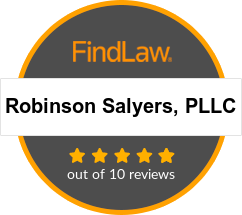Is Bankruptcy The Answer To Your Debt Crisis?
In Franklin County as in other parts of Kentucky, private individuals, couples and business owners sometimes find themselves in financial dire straits for reasons such as the following:
- Job loss or demotion
- Business income decline
- Medical expenses
- Divorce, the death of a breadwinner or other changes in family structure
- Disasters such as tornadoes, severe storms, floods, fires and robberies
- Overextended credit
The reasons you struggle with debt are surely unique to you and your situation in life. The right solutions should also be tailored to suit your circumstances. A debt relief attorney at Robinson Salyers, PLLC, can provide the personalized guidance that you need to overcome financial challenges. Understanding that bankruptcy is a serious step to take, we do not urge residents of Franklin County to file bankruptcy without first considering reasonable alternatives.
When Debt Consolidation And Other Remedies Do Not Offer The Protection That Bankruptcy Does

As an experienced litigator and bankruptcy attorney, our firm’s founder, John Christopher Robinson, skillfully helps clients in communities and rural areas along Interstate 64, U.S. highways 50, 460 and 42, and elsewhere in Franklin County. With trustworthy guidance, our clients find their way to financial stability once again through various methods, including:
Chapter 7 bankruptcy: Many consumers have most or all of their debts discharged through this type of bankruptcy. You can stop creditors from harassing you and clear your slate of debts within several months if you qualify for Chapter 7 and complete all requirements.
Chapter 13 bankruptcy: If your income or home equity is substantial, Chapter 13 bankruptcy may be the best way to stop foreclosure through debt reorganization. Over three to five years, you can pay back secured debt, including mortgage arrearages and car payments, along with other debts, at a low interest rate. At the end of the repayment period, your remaining unsecured debt may be wiped out through discharge.
A bankruptcy alternative: Discuss other ways to resolve your debt crisis before deciding on bankruptcy. Direct negotiations with creditors may be an option.
How Wage Garnishment Works
Creditors have the right to ask the court to order your employer to pay a portion of your paycheck to them. This is called wage garnishment. State and federal laws allow for the garnishment of up to 25% of the debtor’s disposable weekly wages, or the amount by which your wages exceed 30 times the federal minimum hourly wage, whichever is less. If you take no action to stop it, the garnishment will continue until the debt is paid off.
However, you can take steps to try to prevent or halt a wage garnishment, such as by filing for an exemption or bankruptcy protection. Our team of bankruptcy attorneys will fight to restore your full wages to you as soon as possible.
What Can I Do About Mounting Credit Card Debt?
These days, it is not unusual for a family to owe more on their credit cards than they can afford to repay. A job loss or other financial emergency can force you to put all your expenses on your card, then pay only the minimum each month. Over time, the balance can grow out of control and beyond what you could ever afford to pay off without help.
Fortunately, you could have several options, such as debt consolidation, negotiating with the credit card company and bankruptcy. You should know all possible strategies available to you before proceeding. Our firm believes in finding the best solution tailored to every client’s debt issues, whether that means filing for bankruptcy or something else.
What To Do Before — And After — Your Car Gets Repossessed
Most people rely on their car, truck or SUV to commute to work, run errands and transport their children around. The lender repossessing your car can be an embarrassment and a huge inconvenience that could cost you your job and make your debt problems worse.
If you are struggling to make your auto loan payments or have already missed a payment, promptly filing for Chapter 7 or Chapter 13 bankruptcy can stop repossession efforts and give you a chance to breathe while retaining your vehicle.
Chapter 7 bankruptcy will immediately stop and delay repossession efforts. Filing for Chapter 13 stops repossession efforts and sets up a repayment plan so you can keep your car while getting caught up on payments.
You may have options after the lender repossesses your vehicle too:
- Ask the lender why they repossessed your vehicle.
- Ask if you can get it back. Usually, the lender will give you your car back if you can pay the loan balance in full, and they sometimes will negotiate new loan terms.
- Make sure the lender returns property that was inside the vehicle when it was repossessed. That still belongs to you.
- Once the lender sells the vehicle at auction, ask if you still owe money on the loan, which is possible depending on the sale price.
We will advise you of your options regarding your vehicle and dealing with an auto loan in default.
Are You Ready To Find Your Way Forward?
If bankruptcy is the most suitable answer for you, we will help you follow the steps to a financial fresh start through bankruptcy or another means of debt relief. To schedule a free consultation, call 502-257-5417 or complete our simple online form.
We are a debt relief agency. We help people file for bankruptcy relief under the Bankruptcy Code.




